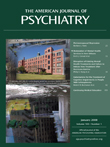To The Editor: In his letter to the Editor, Dr. Plante suggests that our conclusion, which indicates that adjunctive modafinil “did not pose an added risk of mood destabilization,” may be premature, since we did not address the potential confound that a greater percentage of modafinil subjects were treated with adjunctive sedative hypnotic medications, such as clonazepam, lorazepam, or zolpidem. Additionally, he presents an important overview of the risk of mania associated with antidepressants and sleep deprivation and highlights specifically our exclusion criteria of a baseline pattern of sleep <6 hours.
The only study criteria related to medication status was depression that was inadequately responsive to a mood stabilizer, plus or minus additional antidepressant therapy. The mean number of psychotropic medications at the time of randomization was not significantly different for subjects receiving modafinil (3.5) and placebo (2.9). Subjects were receiving a mood stabilizer, but the mood stabilizer was often in conjunction with an antidepressant (modafinil group: 61%; placebo group: 55%), a second mood stabilizer, or sedative hypnotics in various combinations.
Treatment-emergent hypomania (defined as a Young Mania Rating Scale score >13) did not differ between the modafinil subjects (6/41 [14.6%]) and placebo subjects (5/44 [11.4%]). Additional antidepressant treatment did not contribute to the rate of treatment-emergent hypomania between groups. We conducted this post hoc analysis given that the majority of subjects in the study were receiving antidepressants and had clear liability of manic risk. While sedative hypnotics may protect against manic induction, this has not been well documented for substance-induced switches, and only a minority of patients were receiving sedative hypnotics in our study. Nonetheless, of the six subjects who became hypomanic or manic while receiving modafinil, three were treated with sedative hypnotics and three were not treated with sedative hypnotics.
Although the literature on modafinil in adult bipolar disorder is small and primarily retrospective, these preliminary studies, which involved more than 40 patients, have reported no manic switches
(1 –
3) . Menza et al. (1) reported three bipolar depressed patients who responded to modafinil; two of these patients were undergoing modafinil and antidepressant therapy without concurrent mood stabilization. Fernandes et al.
(2) presented a case report on two euthymic bipolar patients who were receiving a mood stabilizer/antidepressant combination without additional sedative hypnotic treatment. The study conducted by Nasr et al.
(3) reported a total of 191 patients with mood disorders (bipolar I disorder: N=31; bipolar II disorder: N=33; unipolar depression: N=118; other: N=9). The majority of patients continued to receive the medication for 2 months or longer, 60 patients continued to receive the medication for at least 1 year, and 45 patients continued to receive the medication for at least 2 years. The reason for drop out (N=86) prior to the 2-month mark was because of lack of efficacy (40%), cost (37%), or adverse event (23%), mostly related to sleep. No patient in any group demonstrated a switch into mania/hypomania while receiving modafinil. Finally, a large placebo-controlled trial of modafinil (with active drug: N=158) in major depression was conducted and reported no cases of treatment-emergent mania
(4) .
Dr. Plante emphasizes several important, critical clinical points. Sleep deprivation, whether in our experimental design (our exclusion criteria related to baseline reduced sleep) or in less monitored clinical situations, can precipitate, potentiate, and perpetuate manic symptoms. We agree that careful clinical monitoring is required for patients when modafinil is prescribed. Furthermore, we also emphasize the importance of a careful assessment of current sleep pattern, historical sleep pattern, and characterization of depressive episode prior to non-mood stabilizing treatment. Reduced sleep in the context of depression could be a sign of bipolar-mixed depression (i.e., syndromal depression with manic/hypomanic symptoms, such as reduced need for sleep and racing thoughts), which has been associated with an increased risk of switching while taking antidepressants
(5) . Mixed depression may warrant treatment with a mood stabilizer or an atypical antipsychotic as opposed to a conventional antidepressant or an experimental agent such as modafinil.

